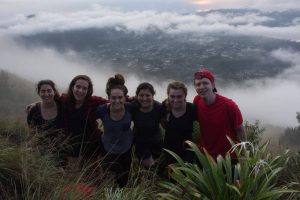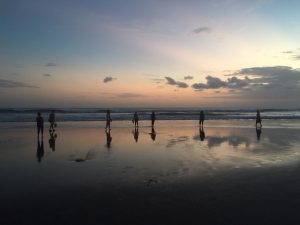I began my college career with a goal to broaden my global perspective. Three years later, Northeastern has helped me achieve this dream with alternative spring breaks to Costa Rica and New Orleans, a dialogue to India, and marine biological research in the Pacific Northwest and in Panama. I found I especially loved visiting megacities where I found rhythm in chaos and harmony in the cacophony. By being immersed in new cultures while studying the environment, I have grown to understand the necessary tensions that exist between sustainability and economic development, innovation and honoring tradition.
 But as my college career began to draw to a close, there were unanswered questions my travels had not yet answered. Predominately, who ought I to be? Research is one area I have considered pursuing. I had always had in mind what it meant to be an ideal researcher: inquisitive, methodical, and concise. What felt uncertain was whether I could fit the mold of my ideal researcher. Sometimes the best thing to do is just start the course. And conducting a SIRF studying culture and sustainability became my first step.
But as my college career began to draw to a close, there were unanswered questions my travels had not yet answered. Predominately, who ought I to be? Research is one area I have considered pursuing. I had always had in mind what it meant to be an ideal researcher: inquisitive, methodical, and concise. What felt uncertain was whether I could fit the mold of my ideal researcher. Sometimes the best thing to do is just start the course. And conducting a SIRF studying culture and sustainability became my first step.
By May, I looked upon my departure with great excitement and a fair dose of second-guessing myself. For months, my SIRF partner Elisa Figueras and I had been planning our project. Though we partnered up for this project as strangers, we were no longer such. For the past four months, we had met multiple times per week crafting our research question and hammering out the details of our design. Our project was tempered and annealed through travel restrictions due to political tension, language barriers, visa application mishaps, and the notorious hoop of gaining IRB approval. But as I checked in for my flight I saw how all the parts had just narrowly come together. Whether I felt ready or not, it was time to begin.
Our project sought to survey locals and interview experts in these coastal communities. We wanted to see if there were any trends in sustainable attitudes based upon how often they visit the coast, their vulnerability to flooding, or their concern for climate change. This required us obtaining local knowledge on the best survey sights, learning new phrases in Indonesian, and putting ourselves out there to get responses.
 And as the project continued, my concept of the ideal researcher began to expand. I found that my research required high people skills and humility. Aspects of myself that I thought were contradictory to research were encouraged; specifically, my empathy as an interviewer and my ability to bridge gaps between cultures. The question stopped being “how can I fit myself into the mold of a researcher?” and instead became, “how can my mold promote world change through research?”
And as the project continued, my concept of the ideal researcher began to expand. I found that my research required high people skills and humility. Aspects of myself that I thought were contradictory to research were encouraged; specifically, my empathy as an interviewer and my ability to bridge gaps between cultures. The question stopped being “how can I fit myself into the mold of a researcher?” and instead became, “how can my mold promote world change through research?”
Change cannot occur without breaking the status quo. It requires sometimes the destruction of our own understanding in order to cause growth within ourselves. This SIRF broke down my perceived obstacles of pursuing research and my broadened my vision of who I can be.
